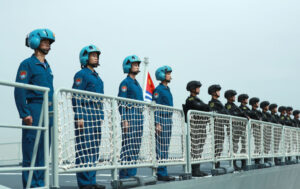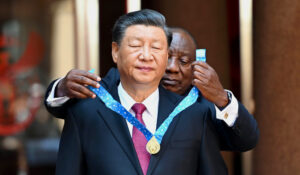“Stop touching her! Don’t touch her!” The screams rang out across the concourse of London’s St Pancras station. “Please. Do not touch her! Please. You are not the same age. Please do not touch her. Don’t touch her. Please don’t touch her.”
Shocked by such raw aggression, the man being accused, public pianist Dr K, withdraws. It’s hard to tell if he did touch anyone, since his hand is just out of shot in the film of the incident. He appears to be reaching for the miniature People’s Republic of China flag the young woman was holding.
The outburst was the climax of a row that started when a group of flag-wavers accosted the station’s public pianist and tried to prevent him from broadcasting any footage showing their faces or voices.
The whole group, who were waiting to play after Dr K, had voluntarily interacted with Dr K in a friendly way just 10 minutes earlier. But as he sat up from the piano, inviting them for a jam, one of the party, Ms Liu asked him not to show their faces in his livestream. “We are filming for Chinese TV […] You’re not allowed [to film us at the piano] because we are for Chinese TV. This is non-disclosable.” At one point, the pianist responded: “We’re in a free country, mate. We’re not in Communist China now, you know.” In response, Mr Leng, another of the group, cried racism, claims since echoed online by Ms Liu.
After the clip went viral, an interview with Piers Morgan followed, as did tabloid headlines, memes and remixes. But why such excitement? Weren’t these merely normal British-Chinese people driven by a concern for their personal privacy? Or was something more sinister going on?
To answer this question, we must to turn to Ms Adelina Zhang (张宁), Dr K’s third interlocutor and supposed hand-touching victim. A decade ago, Zhang surfaced at the coalface of the American branch of China Daily, a regime mouthpiece, writing a range of generally anodyne English-language articles, her only sensitive piece being an investigation of a religious cult banned in China. By 2016, Zhang was in the UK. That year, she triumphed at the “First British Chinese Supermodel Contest”, winning with it the opportunity to work with a company that produces shows for Chinese TV. (By the way, all Chinese TV is controlled by the CCP’s propaganda system, including whatever station the St Pancras crew were working for.)
Zhang has since built a career as a presenter of events associated one way or another with the CCP’s United Front Work Department (UFWD) and its friends. The UFWD has bestowed upon itself responsibility for what it terms “qiaowu” 侨务, or “Overseas Chinese affairs”, meaning for Zhang’s purposes engagement with the Chinese immigrant community in Britain, which includes the likes of Leng and Liu.
UFWD guidance that I’ve been studying states that “Overseas Chinese” are the “sons and daughters of China connected by blood” and that their goal is “national reunification and the great rejuvenation of the Chinese nation”. This is of course nonsense. It is the CCP that wants to “reunify China”. (For “reunify China”, read annex Taiwan, gain control of some Malaysian, Philippines, Vietnamese and Japanese waters, plus hopefully various bits of India and Bhutan too.) The claim that the “Overseas Chinese” share this goal is an attempt to conjure a “broad United Front” in support of the CCP. The CCP thus claims to be speaking on behalf of all “Overseas Chinese”, asserting the right to monitor and guide these people, enticing collaboration and intimidating sources of opposition — all in the service of “national reunification and the great rejuvenation”.
Happy-clappy galas and functions of the kind overseen by reliable hosts such as Adelina Zhang serve various functions. They are a great setting for propaganda. Attracting hangers-on from British commerce, academia and politics also make them a staple source of information and connections for the UFWD and a cosy ecosystem for hard-core spies in the employ of China’s intelligence agencies.
Testimony to Zhang’s personal sociability is provided by a healthy crop of political selfies, including with former Prime Minister Theresa May, former Home Secretary Amber Rudd, former Asia minister Mark Field, and serving Chancellor Jeremy Hunt. Here is an account of Zhang’s work offered last year by a magazine run by the UFWD:
“She has hosted numerous international events and interviewed various business leaders. She has thrice hosted a ‘Spring Festival Gala’ organized by the Overseas Chinese Affairs Office of the State Council [the Office is an alter ego for the UFWD under the characteristically Communist ‘two names, one organisation’ system], served as a bilingual host at the Chinese New Year dinner in the UK House of Lords twice, hosted the London Trafalgar Square Spring Festival gala four times, representing Asian women on the international stage, and hosted what BBC called the world’s largest Spring Festival event outside China, attracting up to 700,000 live viewers annually.”
What of Mr Leng and Ms Liu? Neither has enjoyed a career comparably close to the CCP. Leng’s LinkedIn initially identified him as a consultant for the Financial Times, but the paper has since clarified that it contracted him for just two days once. He used to work at a Confucius Institute and now runs gym classes. Liu, who has tried to capitalise on CCP jingoism online since the incident, runs a company placing Chinese grads in internships and jobs.
The three advanced upon Dr K in reverse order of seniority, first Liu, then Leng, then Zhang. The most intriguing aspect of the incident, though, is the presence in the background of another woman, perhaps in charge. In X posts published afterwards, Liu herself claimed that this was Christine Lee, who MI5 alleged to be a UFWD agent in 2022. Liu appeared to write: “We were filming for Chinese TV, nothing to do with CCP, just a Chinese New Year Video to celebrate a Chinese new year from important figures in the Chinese community in the UK. […] Christine Lee was in the back with my boyfriend, but she was just accompanying.”
Liu then deleted the tweets and then her account was suspended. It is not known why. On top of that, the woman identified as Lee does not actually look like Lee.
It is not easy to see the full picture, but viral events like this act almost as a primer for those unfamiliar with the CCP’s influence efforts abroad: every aspect of the incident reflects some classic phenomenon. Perhaps more importantly, they are also an introduction to the resistance against CCP influence efforts among an emerging coalition of emigres: Uyghurs, Tibetans, Hongkongers, Christians, democratic activists, persecuted artists and lawyers. It is sometimes called a “united front against the united front”. This resistance is carried on above all by those that the CCP desperately wishes were loyal “Overseas Chinese” who support “reunification and rejuvenation”.
The aftermath of “Pianogate” abounds with examples. Take that of British Hong Konger, Jazzua Leung, who went to play his home city’s anthem (banned by the CCP) on the by-then infamous piano. After uploading a video of his performance, Leung’s YouTube account was suspended because of spam complaints by CCP trolls.
Or take the example of any member of the crowd of ethnically Chinese Dr K supporters who flocked to see the pianist on his return to St Pancras. One was my friend Lyndon Lee, a Christian refugee, journalist and human rights lawyer. Or there is Namewee, the Taiwanese musician known for satirising Xi’s CCP, who is now plotting a musical collaboration with Dr K, as well as the army of “Overseas Chinese” amateur sleuths from around the world who endeavoured to dissect every aspect of “Pianogate”.
Look around the world and you will see countless examples of a twilight conflict pitting this resistance against the CCP’s United Front and its pets. Last year, Canada endured an astonishing CCP infiltration scandal that saw the resignation of a serving MP accused of covertly working with the CCP, an attack directed by Prime Minister Trudeau at Canadian intelligence agents leaking info to the media, and revelations of a $1 million plot to influence Trudeau himself. Then and since — a foreign interference inquiry has only just begun in the country — grassroots campaigners such as Natalie Hui and Mehmet Tohti, but also leading politicians such as Michael Chong, have been instrumental in de-stigmatising the conversation around CCP interference and demanding answers about the phenomenon from Trudeau’s government.
The UFWD is not particularly secretive about its intent to interfere in democratic processes: documents I have seen note the growing number of ethnic Chinese running for election in Canada and elsewhere and states a desire to mould them into “a new force in the reunification of the motherland and the rejuvenation of China”.
Ethnonationalist rhetoric such as this has led to radicalisation. This was evident in California last November, when Xi Jinping’s visit prompted both the United Front and its pets and the anti-CCP resistance to take to the streets. This led to brawls between Tibetan-American teenagers, refugees from Hong Kong and dissidents living in the US on the one hand, and middle-aged, red-armbanded Chinese men on the other. The previous year, the state witnessed a mass shooting of Taiwanese-American Christians by a radical opponent of Taiwan independence.
The CCP has long spoken of “Five Poisons”: those in favour of Taiwanese independence, those in favour of Uyghur independence, those in favour of Tibetan independence, practitioners of Falun Gong, and Chinese democrats. Hong Kong independence advocates have been informally added to the list and cast as “parasites” and “roaches” to be “eradicated”. Xi himself, in 2019, warned that anyone who tries to undermine China’s unification will end up with “bodies pulverised and bones crushed.”
This may be Xi’s dream, but the ragtag anti-CCP resistance is his nightmare — and, as Pianogate revealed, it’s not going anywhere. What’s needed, however, is more awareness of their struggle. It is too significant to be relegated to social-media discourse. Far from being solely a threat to Chinese emigres, the CCP’s “war by other means” is an attack on democracy itself.
Disclaimer
Some of the posts we share are controversial and we do not necessarily agree with them in the whole extend. Sometimes we agree with the content or part of it but we do not agree with the narration or language. Nevertheless we find them somehow interesting, valuable and/or informative or we share them, because we strongly believe in freedom of speech, free press and journalism. We strongly encourage you to have a critical approach to all the content, do your own research and analysis to build your own opinion.
We would be glad to have your feedback.
Source: UnHerd Read the original article here: https://unherd.com/



